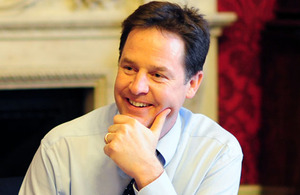Brazil looks to UK for advice on match day safety
Nick Clegg today traded football shirts and skills with Brazilian football legend Carlos Alberto Torres at the Maracana Stadium in Rio.

The Deputy Prime Minister presented a Team GB football shirt for the football museum at the Maracana.
He also played football with young people from the Morro des Prazeres favela, whom he met when he launched the Premier Skills project last year.
On the visit, DPM met Brazil’s State Secretary for Sport Marcia Lins and Deputy Minister for Sport Luis Fernandes to discuss security and safety measures for the 2014 World Cup to be hosted by Brazil.
The UK is heavily involved in ensuring a social, environmental and economic legacy for the World Cup in 2014.
The visit is part of the DPM’s trip to the Rio+20 summit. UK companies have been involved in carbon footprinting all of Brazil’s World Cup venues, adding to the environmental legacy of the tournament.
With the world watching, Brazil wants to kick the violence out of football - other tournaments have been blighted by violence, and Brazil are turning to Britain for advice. Britain is a centre of excellence in this field, having tackled the problems of hooliganism and match day safety in the 1980s.
The Deputy Prime Minister said:
Whenever a Brit and a Brazilian meet up, it’s a good bet that one of the first things they talk about will be football. This real shared cultural touchstone is one of the things that binds us together, and the football industries are leading the way in partnership and cooperation between Brazil and the UK.
British companies are already delivering millions of pounds worth of goods and services to the World Cup in a huge range of sectors including transport, sustainability consultancy, steward training, stadium management, crowd movement, security, ticketing and hospitality. This is just a sample of the opportunities provided by our shared passion. The next few years are going to be huge for sport in Brazil. I know that the UK will be beside them every step of the way.
The Deputy Prime Minster, Carlos Alberto, Ms Lins and Mr Fernandes, also announced an extension of the successful Premier Skills community programme, the Brazilian arm of which was launched in Rio by the Deputy Prime Minister exactly a year ago.
The programme helps youngsters from favelas by getting them involved in football sessions three times a week and citizenship classes, bringing communities together and build confidence.
Since it was set up last June in the favela of Morro dos Prazeres, more than 300 young people applied to participate and the project regularly attracts over 100 young people to each session.
Expanding the project to two more favelas in Sao Carlos and Faget Fogueteiro will mean that over 1,000 young people can be reached.
In March 2012, 10 of the young people involved in the project, along with coaches and police, visited the UK and spent time at Tottenham Hotspur, interacting with young people involved in the club’s own Kickz programme and improving their English using the Premier Skills English materials.
Notes to editors
Premier Skills is a partnership between the Premier League and the British Council, which uses football as a tool to engage with and develop the skills of young people. The programme concentrates on three main areas:
- Face-to-face training for coaches and referees, using highly skilled Premier League clubs and coaches. Participants are then supported in developing their own community-focused football projects.
- Linking community projects run by Premier League clubs to similar projects in other countries, building long-term partnerships that aim to change the lives of thousands of people.
- Developing Premier League and broader football-related English language products for teachers and learners, via a dedicated website.